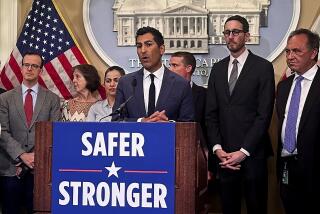Wilson to OK Tougher Terms for Carjackings, Killings : Legislation: Drive-by slayings will automatically be classified as first-degree murder under law to be signed. Murderers will no longer be able to reduce terms by working in prison.
- Share via
SACRAMENTO — Gov. Pete Wilson said Tuesday that he intends to sign a package of legislation to toughen sentences for those who are convicted of murder, carjacking or drive-by shootings.
The Republican governor met in his office with participants in a task force that he said had reduced violent crime in the San Francisco Bay Area community of East Palo Alto, a town of 24,000 people that had 42 murders last year.
But Wilson said a single success story cannot be replicated statewide without tougher laws and bolstered resources for local law enforcement agencies.
“The streets in . . . cities all around our state are being stained with the blood of our children,” Wilson said. “It’s time to say, ‘enough.’ ”
The governor, who has made fighting crime a major issue in nearly all of his political campaigns, appears to be intent on seizing the issue again as he prepares to run for reelection in 1994. Wilson is scheduled to follow up on Tuesday’s event by holding bill-signing ceremonies for the benefit of Los Angeles television cameras today and Thursday.
Wilson, in a private ceremony before Tuesday’s event, signed legislation denying work credits to imprisoned killers--a longtime goal of law enforcement and crime victim groups.
Until now, convicted murderers have been able to reduce their sentences by a day for every day that they work while behind bars--allowing them to cut their sentences in half. Now they will be forced to serve their entire sentences.
The legislation on drive-by shootings will automatically classify as first-degree murder any killing committed deliberately by shooting a firearm from inside a motor vehicle. The crime will be punishable by a term of 25 years to life in prison.
The carjacking bill makes stealing a car under threat of violence a distinct crime with sentences of up to 18 years.
The governor also signed 15 other crime-related bills, most of which will continue a trend toward longer sentences that began in the 1980s.
Experts disagree about whether the tougher sentencing laws have had an effect on the crime rate. But there is no doubt that the laws have led to a surge in the state prison population, which soared from about 35,000 a decade ago to more than 110,000 today.
All three bills cited by Wilson sailed through the Legislature on nearly unanimous votes. The only organized opposition came from civil rights and prisoners rights groups.
Wilson also signed one crime prevention measure, enacting legislation to give $1.6 million in state money to a Los Angeles program aimed at breaking the cycle of gang life among urban children.
Wilson said the Hope in Youth program assists in the development of alternatives to gangs and works through a network of “Family Outreach Teams” located at churches in neighborhoods plagued by gangs.
More to Read
Sign up for Essential California
The most important California stories and recommendations in your inbox every morning.
You may occasionally receive promotional content from the Los Angeles Times.













